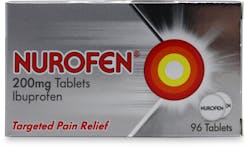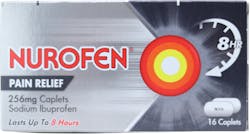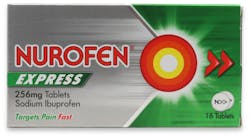Nurofen Meltlets Lemon Self-dissolving 200mg 12 Tablets
Nurofen Meltlets Lemon Self-dissolving 200mg 12 Tablets
What 500,000+ customers say about medino:
Description
Nurofen Meltlets Lemon Self-dissolving 200mg 12 Tablets offer quick pain relief. These dissolve on the tongue, needing no water. Use them to ease headaches, backaches, and other pains. Suitable for adults and kids aged 12 and older. Ideal for fast, on-the-go relief.
Key Features
- Fast-acting: Dissolves quickly on the tongue for rapid relief.
- No water needed: Convenient for any time, any place.
- Lemon flavour: Easy to take with a pleasant taste.
- Versatile: Relieves various types of pain and fever.
- Compact size: Fits easily in bags or pockets.
- Trusted brand: Made by Nurofen, a trusted pain-relief maker.
How long do these tablets take to work?
Nurofen Meltlets work within 20 to 30 minutes. The fast-dissolving form may act quicker than regular tablets.
Can I take these tablets if I'm pregnant?
Consult your doctor before using Nurofen Meltlets during pregnancy. They can guide you on safety for your condition.
How many tablets can I take in a day?
Adults can take up to six tablets daily. Space doses at least four hours apart.
Ingredients
Contains: Ibuprofen 200mg, aspartame (E951), gelatin, mannitol (E421), citric acid, sodium hydrogen carbonate, sodium laurilsulfate, lemon flavour, magnesium stearate, polyvinylpyrrolidone. Each tablet provides the equivalent of 14mg of phenylalanine.
Usage and Instructions
Dosage: For oral administration and short-term use only.
Adults, adults aged 65+ and children & adolescents between 12 and 18 years: Take 1 or 2 tablets up to three times a day as required. Place tablets on the tongue, allow them to dissolve and then swallow; no water is required. Leave at least 4 hours between doses. Do not take more than 6 tablets in any 24 hours. Do not give to children under 12 years of age.
Children and adolescents between 12 and 18 years: If the product is required for more than 3 days, or if symptoms worsen a doctor should be consulted.
Adults: If the product is required for more than 10 days, or if symptoms worsen a doctor should be consulted.
Read the enclosed leaflet carefully before use.
Warnings
Children and adolescents between 12 and 18 years: If the product is required for more than 3 days, or if symptoms worsen a doctor should be consulted.
Adults: Do not take for longer than 10 days unless your doctor tells you to. If you do not get better, or get worse, talk to your doctor. They will tell you if its is safe to carry on taking the medicine.
Do not take more medicine than the label tells you to.
Don't take this medicine if you:
- Have (or have had two or more episodes of) a stomach ulcer, perforation or bleeding
- Are allergic to ibuprofen (or anything else in this medicine), aspirin or other related painkillers
- Are taking other NSAID painkillers, or aspirin with a daily dose above 75mg.
Speak to our pharmacists or a doctor if you:
- Have or have had asthma, diabetes, high cholesterol, high blood pressure, a stroke, heart, liver, kidney or bowel problems or are dehydrated
- Are a smoker
- Are pregnant.
Keep out of the sight and reach of children.
Side Effects
Like all medicines, Nurofen can cause side effects, although not everybody gets them. Side effects may be minimised by taking the lowest dose for the shortest time necessary to relieve the symptoms. You may suffer one of the known side effects of NSAIDs (see below).
If any of the side effects gets serious, or if you notice any side effects not listed in this leaflet, tell your doctor or our pharmacists.
Stop taking the medicine and seek immediate medical help if you develop:
- Signs of intestinal bleeding such as: bright red faeces(stools/motions), black tarry stools, vomiting blood or dark particlesthat look like coffee grounds.
- Signs of serious allergic reaction such as:
- Difficulties in breathing or unexplained wheezing
- Dizziness or faster heartbeat
- Severe forms of skin reactions such as itchiness, skin rash with redness, peeling, flaking or blistering (e.g.: Steven-Johnson syndrome)
- Swelling of your face, tongue or throat
- Signs of kidney problems such as:
- Passing less or more urine
- Cloudy urine or blood in urine
- Pain in the back and/or swelling (particularly in the legs)
- Signs of aseptic meningitis with neck stiffness, headache, feeling sick, being sick, fever or consciousness. Patients with autoimmune disorders (lupus, mixed connective-tissue disease) may be more likely to be affected.
A severe skin reaction known as DRESS syndrome can occur.
Symptoms of DRESS include: skin rash, fever, swelling of lymph nodes and an increase of eosinophils (a type of white blood cells). Stop taking the medicine and tell your doctor if you experience the following uncommon side effects which affect 1 to 10 users in 1,000:
- Indigestion, heartburn or feeling sick
- Pains in your stomach (abdomen) or other abnormal stomach problems
Tell your doctor if you have any of the following side effects, they become worse or you notice any effects not listed:
Uncommon side effects which affect 1 to 10 users in 1,000:
- Allergic reactions, such as skin rashes (urticaria), itching, peeling
- Headaches
Rare side effects which affect 1 to 10 users in 10,000:
- Flatulence (wind), diarrhoea, constipation and vomitingVery rare side effects which affect less than 1 user in 10,000:
- Blood disorder resulting in unexplained or unusual bruising or bleeding, fever, sore throat, mouth ulcers, flu-like symptoms andsevere exhaustion
- Drop in blood pressure or irregular heartbeat
- Stomach or intestinal ulcers, sometimes with bleeding and perforation, inflammation of the lining of the mouth with ulceration(ulcerative stomatitis), inflammation of the stomach (gastritis)
- Liver problems
Side effects for which the frequency can not be estimated from available data:
- Worsening of asthma or bronchospasm
- Swelling (oedema), high blood pressure, heart failure or attack
- Worsening of colitis and Crohn’s diseaseMedicines such as Nurofen Meltlets Lemon may be associated with a small increased risk of heart attack ("myocardial infarction") or stroke







